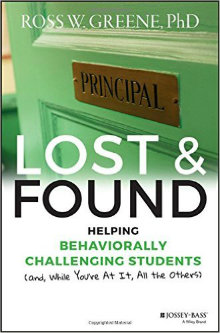Behavior: Helping Lost Students Find Their Way
Lost & Found: Helping Behaviorally Challenging Students (and, While You’re At It, All the Others)
By Ross W. Greene, PhD
(Jossey-Bass, 2016 – Learn more)

Lost & Found: Helping Behaviorally Challenging Students is a very beneficial book that helps us support all students who are struggling in our classrooms. I wish I had read this book with a professional learning community, so I could have discussed how the implementation of the “ALSUP” (Assessment of Lagging Skills & Unsolved Problems) has benefited the students when they are in conflict with others and themselves.

Beyond traditional practice
Currently, most labeling of students with a behavior problem is based on an educator’s observations, a checklist of problematic behavior with data to support it, a BASC rating and a psychological diagnosis. I am not saying that we should disregard the evidence that we acquire from using these tools, but I do think the ALSUP gives us a deeper understanding of a student’s behavior before we assign a label that will certainly have a significant impact on their life in school.
I wish I’d come upon this book sooner. After reading Lost & Found, I am better prepared to work with high school learners who are transitioning back to school to obtain their high school diploma (after having left a traditional school setting). Many of the students that I work with are not just trying to obtain their diplomas but are making a transition from incarceration or are holding down a job and taking care of children or other family members.
A helpful structure
I especially like the layout of the book and how each chapter builds upon the ones before. Also beneficial are the built-in resources, the questioning techniques, and the real-life examples. While I was reading Lost & Found, I was constantly highlighting, underlining and making comments in the margins and on post-it notes. This book is already helping me change my thinking and my processes when talking to students in crisis.
The nine chapters in this book are broken down into manageable steps as you learn to use the ALSUP and support students who challenge us in our classrooms.
Chapter 1 The Who
Chapter 2 The Mess
Chapter 3 The Shift
Chapter 4 The ALSUP
Chapter 5 The Plans
Chapter 6 The How To
Chapter 7 The Pitfalls
Chapter 8 The Logistics
Chapter 9: The Others
In the first chapter, Greene states: “Challenging kids are challenging because they’re lacking the skills to not be challenging. In other words, challenging behavior is reflective of a developmental delay.” This spoke to me as an educator and leader who encounters many students referred for assistance because they are challenging, they are refusing to comply, they are showing up to school late or not at all, and they are being loud and boisterous in the educational setting.
I really like how the six key themes within Dr. Greene’s CPS model (Collaborative & Proactive Solutions) were presented in the book – in ways that help me connect ALSUP to a written plan for supporting struggling students.
 The ALSUP process in practice
The ALSUP process in practice
If you are going to implement the ALSUP process, you need to remember that it should not be done in isolation. This process has to be used with key stakeholders and the student in question. Also, you need to focus on one lagging skill at a time. If you focus on all the lagging skills at once, you will become overwhelmed and it will be harder to obtain positive results and outcomes.
If you want to build capacity, be proactive in building interventions to unsolved problems, and prepare students to solve problems and communicate their concerns in a positive way, you need to check out this book. I really enjoyed it, and I am going to read it again.
Nicolette Lesniak is an educator with over 10 years of experience teaching at-risk students in Chicago. She enjoys mentoring and supporting teachers with the everyday challenges and joys of teaching diverse learners. She lives in Northwest Indiana with her husband Jim and her cat Charlie.

 The ALSUP process in practice
The ALSUP process in practice
































